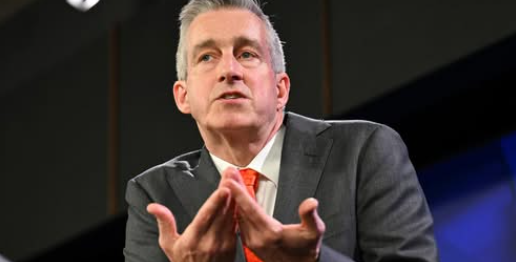
When the head of Australia's largest superannuation fund calls part of the system 'stupid', it is hard to ignore.
Paul Schroder has not held back in criticising the bureaucracy that makes retirement unnecessarily complicated for millions of Australians.
With retirement looming for millions, his comments are a wake-up call.
'It is more than a wave, it is a tsunami of working Australians about to retire,' Schroder told the National Press Club.
'Some planning, some preparing, and so many not sure what to do.'
This isn't mere exaggeration. Less than half of Australians feel confident about retiring, and only half apply for the aged pension as soon as they are eligible.
For many, what should be an exciting life stage is instead filled with uncertainty and stress.
In this article
The Retirement Tsunami
With 2.5 million Australians expected to retire within the next decade, the pressure on the superannuation system has never been greater.
Schroder warned that the current set-up is confusing, inefficient, and ill-suited for Australians approaching retirement at different stages of life.
The challenge is particularly pressing given that superannuation contributions have just reached 12 per cent from July 2025—the system’s full maturity point.
After decades of incremental increases, the super system must now deliver on its promises.
The 'Stupid' Problem Making Retirement Harder
So what has Schroder singled out as particularly problematic? A confusing account structure that forces Australians to juggle multiple super accounts depending on whether they are working or drawing down income.
'Currently, the system requires members to open a separate retirement account if they want to draw down an income and another one if they want to keep contributing. Just how stupid is that?'
Take Bachir, an AustralianSuper member for 25 years.
'Currently the system requires members to open a separate retirement account if they want to draw down—and another if they want to keep contributing. For Bachir, that means two accounts, two sets of fees, and far too much hassle.'
The Current System Problem
Keep working part-time AND draw some super = 2 separate accounts
Stop drawing super temporarily and go back to work = Account switching required
Integrate super with Age Pension planning = Complex separate processes
Result: Multiple accounts, multiple fees, maximum confusion
For Australians gradually easing into retirement, this red tape can be a significant barrier.
A system designed for flexibility should make transitions easier, not harder.
Australia’s System Is Strong—But Not Perfect
Australia’s superannuation system is widely admired internationally.
'The super system is the envy of the world. Policymakers and financiers across the world are talking to us about what they can learn from our system,' Schroder said.
The numbers support his claim. Australia spends just 2.3 per cent of GDP on aged pensions, compared with nine per cent or more in other developed nations.
The super system effectively reduces reliance on the Age Pension, demonstrating its efficiency.
Did you know?
Did You Know? AustralianSuper ranks among the top 20 pension funds globally and is projected to enter the top 10 by 2035, managing $1 trillion for five million members.
Despite market volatility, AustralianSuper has delivered strong returns.
The Balanced option—used by most members—returned 9.52 per cent for the year to 30 June 2025, reflecting the system’s underlying strength.
A $40 Billion Domestic Investment
Schroder is not just pointing out problems; he is acting.
AustralianSuper has earmarked $40 billion for domestic investment over the next five years.
'If you’re a company with a good idea, if you’re a government with a big plan — our door is open. We’re ready to invest but only when it benefits members — and where risk-adjusted returns warrant the investment.'
This represents a shift from investing solely for high returns abroad to actively building Australian infrastructure while delivering returns for members.
'Australia is now one of the few countries in the world that exports equity capital—meaning we invest more overseas than we borrow. That’s a key reason why our net foreign liabilities have more than halved between 2016 and 2025.'
Equity Challenges Remain
Even with the system’s successes, gaps remain.
Schroder emphasised that all Australians deserve to live well in retirement, including women, gig workers, migrants, and First Nations Australians.
'Too often that is not true for Aboriginal and Torres Strait Islander people where lower life expectancy, less time in well-paid work and the challenges of language and record-keeping can all have a material, detrimental impact.'
Consider Sarah, a 55-year-old who took career breaks to care for children and elderly parents.
While male colleagues accumulated super continuously, her stop-start career leaves her with less retirement savings.
The system currently fails to adequately compensate for these interruptions.
From July 2026, Paid Parental Leave payments will be made directly to individuals’ superannuation funds.
AustralianSuper has championed this policy as a way to reduce structural inequalities that result in lower balances for women at retirement.
Super as an Economic Engine
Schroder stressed that super is not a political piggybank.
'Australia’s retirement savings pool was not a political ‘piggybank’. Super is not a trillion-dollar fix-all. It cannot — and it should not — be used to solve every complex national problem.'
The warning comes amid debates on using super for housing or infrastructure funding.
While strategic investment in Australian assets is encouraged, Schroder warned that government interference could risk members’ money.
'It would be a disaster for members if governments tried to tell us what to invest in. Members carry the investment risk, and it is their money.'
'We’re ready to invest but only when it benefits members and where risk-adjusted returns warrant the investment. So, superannuation has a role in national renewal…But not every project will stack up for members.'
Looking Ahead
Schroder envisions super as central to Australia’s economic future, on par with wool in the 19th century and iron ore since 2000.
By 2030, AustralianSuper expects to have more than $250 billion invested domestically, roughly nine per cent of GDP.
The Future of Australian Retirement
A photorealistic lifestyle image shows a diverse group of older Australians, relaxed and confident at a modern café table with laptops and tablets.
This illustrates the vision of financially secure retirement with flexible transitions and confidence in managing money.
'We’ve become a world-leader in the accumulation of retirement savings. We must become a world-leader in the delivery of retirement incomes,' Schroder said.
The Reform Agenda
Streamlined Account Structure: Contributions and drawdowns co-existing in a single account.
Age Pension Integration: Automatic data sharing between super funds and government to simplify applications.
Flexible Work-Retirement Transitions: Easy movement between working, saving, and drawing super.
What This Means For You
Less than half of Australians feel confident about retirement, leaving many worried about their financial future and unsure how to plan effectively.
This uncertainty is compounded by the current system’s requirement for multiple accounts, which creates extra fees, administrative hurdles, and stress for those trying to manage their super efficiently.
Paul Schroder’s announcement of a $40 billion domestic investment highlights the evolving role of super funds—not just as a savings vehicle but as a driver of national infrastructure and economic growth.
The proposed reforms, including streamlined accounts, automatic Age Pension integration, and flexible transitions between work and retirement, aim to make the system fairer and simpler for everyone, particularly for women, gig workers, and other disadvantaged groups.
For everyday Australians, this could mean a smoother, less stressful retirement journey, more predictable finances, and the confidence that their super is working both for them and for the country’s future.
‘Kind of logical’: AustralianSuper boss Paul Schroder backs raid on $3m nest egg | The Nightly — Paul Schroder warns of a retirement “tsunami” and urges urgent reform to the superannuation system.
https://thenightly.com.au/business/...schroder-backs-raid-on-3m-nest-egg-c-19895561
AustralianSuper bets $40bn at home, calls on government to deliver investable projects—InvestorDaily — AustralianSuper plans $40 billion in domestic investments and urges government-backed projects to support retirement savings.
https://www.investordaily.com.au/su...-on-government-to-deliver-investable-projects
Superannuation Changes—Federal Budget 2025-26 | AustralianSuper — Outlines recent and upcoming changes to superannuation contributions, including the increase to 12 per cent from July 2025.
https://www.australiansuper.com/superannuation/changes-to-superannuation
AustralianSuper warns of ‘retirement tsunami’, calls for urgent system reset | Super Review — Schroder emphasizes the need for a superannuation system reset and warns of the growing number of retirees.
https://www.superreview.com.au/news...-retirement-tsunami-calls-urgent-system-reset
Is it time to simplify? Super fund chief urges reform to modernise the system | YourLifeChoices — Schroder highlights challenges in the current system and calls for simplification to support all Australians in retirement.
https://www.yourlifechoices.com.au/...nd-chief-urges-reform-to-modernise-the-system
Chief Executive Update | AustralianSuper — Reports investment performance, noting the Balanced option returned 9.52% for the year to 30 June 2025.
https://www.australiansuper.com/campaigns/chief-executive-update
Paul Schroder—National Press Club of Australia — Schroder draws historical parallels, noting superannuation’s potential importance to Australia comparable to wool and iron ore.
https://npc.org.au/events/paul-schroder
Break 'piggy bank mentality': super fund call to action—Michael West — Schroder emphasizes investing for members only when risk-adjusted returns warrant it, discouraging political use of super funds.
https://michaelwest.com.au/news/break-piggy-bank-mentality-super-fund-call-to-action
What changes would make the biggest difference to your retirement planning?







